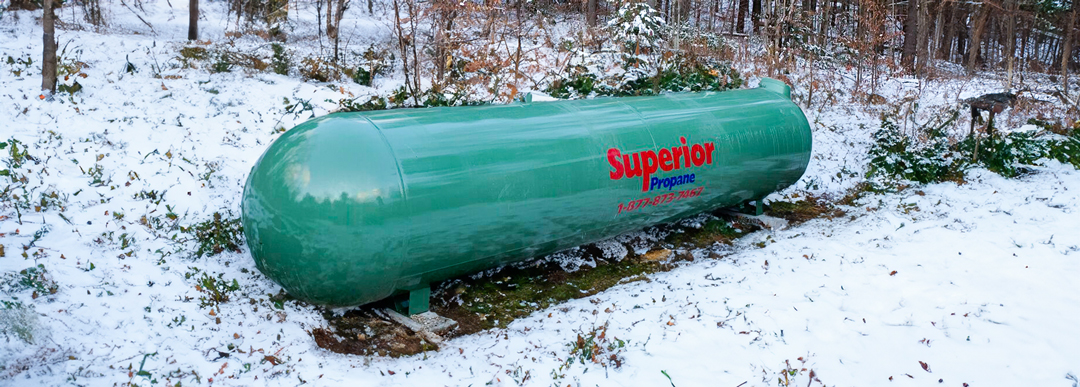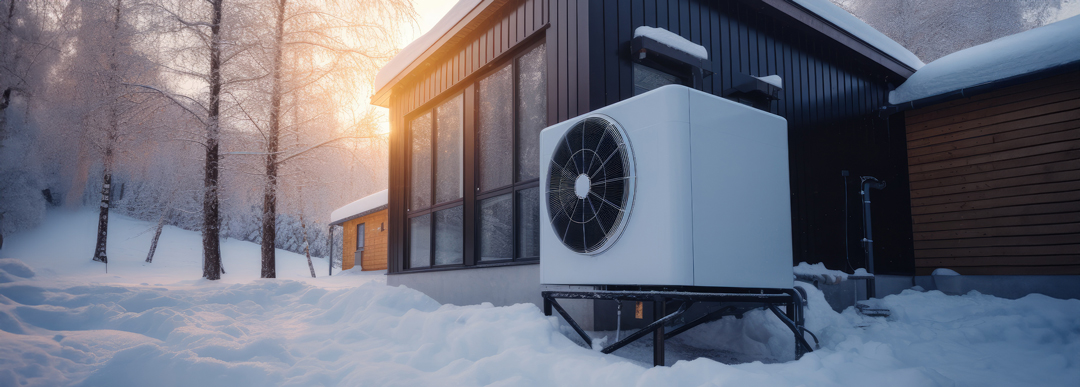Winter Home Heating FAQ:
Using your Propane Tank in the Winter
Propane excels in Canadian winters, offering not just warmth but also superior efficiency and cost-effectiveness. Explore how propane meets diverse home heating needs and get answers to the most common winter energy questions.
In rural Canada where the choices for home heating are many, propane stands out for its reliability, efficiency, and cost-effectiveness. At Superior Propane, we understand the importance of a dependable energy source during the cold winter months. That's why we're here to answer the most pressing questions about using propane for home heating, back-up power, and more. Whether you're wondering about its performance in extreme cold or its versatility across different applications, we have tips for keeping your home comfortable and warm all winter long.
Propane Home Heating FAQ: Indoor Warmth and Outdoor Comfort
Discover how to leverage propane for optimal home heating, from your living room to your backyard. Propane's versatility makes it an excellent choice for a range of heating appliances.
Can You Leave Propane Out in the Winter?
Yes, propane tanks with propane inside of them can be left outside in freezing temperatures. Your local Superior team understands the climate they’re working with and will take measures to ensure your propane keeps flowing in any temperature.
Like all liquids, propane contracts when it gets really cold, which impacts the volume and pressure in the tank. This may affect gauge readings, giving the impression that the tank has less propane in it than it actually does. Your Superior Propane driver will take these factors into account when refilling your propane tank. It may appear that the tank wasn’t filled to capacity, but it may just in fact be a result of the temperature's effect on propane pressure.
Whether you’re using the propane for outdoor appliances like patio heaters or back-up power generators, or for indoor heating with propane furnaces, propane water heaters or fireplaces, we’ll make sure the propane system operates smoothly throughout the season.
How Do You Use Propane in the Winter?
- Order more propane when your tank level reaches 30% (refills are automatically scheduled for customers on the Auto Delivery program). This gives us plenty of time to secure your fuel, load it onto the truck and make your delivery. It also takes into account road conditions, closures, and all the possibilities we face during Canadian winters.
- Clear snow off your tank so that the sun can help add some warmth. Keeping the tank and surrounding area clear of snow also ensures a quick and safe propane delivery for your driver. Learn more about how to prepare for a winter delivery.
- Ensure your propane appliances are checked by a certified technician before the cold season to ensure they are in good shape. Get your propane appliances inspected before the cold weather sets in. Keep your appliances such as propane furnaces, water heaters and fireplaces in tip-top shape by working with one of our certified partners for service, installation and more services for your propane appliances.
Why Is Propane Preferred in the Winter?
Propane indoor heaters and propane furnaces offer a high heat output and are energy-efficient, making them preferred choices for Canadian homes seeking reliable home heating solutions. Propane is also more cost effective than other commonly used energy sources in rural Canada, both from a product cost standpoint but also because appliances require less maintenance, leading to additional savings in the long run. Learn more about how propane is priced.
Propane Tank Winter Safety: Ensuring Reliability and Performance in the Cold
Safety and efficiency are paramount when it comes to propane tank management during the winter months. Learn how to protect and optimize your propane supply during the colder months.
How do you Prevent Propane Tanks from Freezing?
Propane and propane tanks do not freeze under normal circumstances; therefore, you do not need to worry about the tank or the propane itself even in very cold temperatures. Propane systems can handle the cold, and when the propane tanks are installed, temperatures are taken into consideration to make sure the propane system works and performs as intended. Visible frost outside the tanks is a common occurrence in low temperature areas and does not mean that the tank or the propane inside it are frozen.
However, it is important to keep an eye on the performance of your propane system. If performance has been affected, or new propane appliances have been added, then it's time to contact your propane supplier or a licensed technician that can evaluate your propane system and assess if you have the right tank size for your needs.
How Long Should Propane Last in Winter?
We consider several factors to determine whether you have enough propane until we get there, including outdoor temperatures, your usage patterns, your tank size and whether you use propane as your primary heating source or for other propane uses. If you have a tank sensor and are on our auto delivery program, rest assured we’re monitoring your levels and will automatically schedule your deliveries.
To help make sure you always have enough propane, it’s important to update us if your usage changes (for example, if you renovate or add appliances) so that we can consider rightsizing your tank to make sure you have enough propane to match your needs. We begin scheduling deliveries when the tank level reading is approximately 30%. This gives us plenty of time to get to you. For some customers, even 10% is enough propane to last a while if the tank is right sized to match their usage.
Propane is a cost-effective and efficient energy source, particularly for heating, but there are always ways to optimize its use during the coldest months. Learn more about optimizing propane use during winter here.
Make the most out of your propane and manage your energy bills effectively by choosing from our flexible pricing plans. These plans are tailored to fit your specific needs, ensuring you get the best value without compromising on comfort or peace of mind.
Embracing Heat Pumps: A Shift Towards Sustainable Heating in Canada
In Canada's move towards greener and more efficient home heating, heat pumps are gaining prominence. Supported by initiatives like the Canada Greener Homes Initiative and the Oil to Heat Pump Affordability (OHPA) Program, this shift highlights the growing importance of sustainable heating solutions, which are even better when integrated with low-emission, sustainable fuels like propane.
The Efficiency of a Heat Pump in Canadian Climates
In colder climates, traditional heat pumps may face challenges in efficiently extracting heat from extremely cold air. This is where propane comes into play. Advanced heating systems often combine heat pumps with propane in a dual fuel setup. During milder temperatures, the heat pump operates efficiently on its own. However, when temperatures drop to levels where the heat pump’s efficiency decreases, the system automatically switches to propane heating. This switch ensures consistent and reliable heating, leveraging the efficiency of the heat pump for moderate conditions and the power of propane during extreme cold. Such an integrated system provides a seamless heating experience while optimizing energy use and cost-effectiveness.
Pump Heater Systems: Balancing Cost and Performance
While pump heater systems offer long-term savings, integrating them with propane heating can enhance their cost-effectiveness. Propane's high energy output complements the pump heater's efficiency, leading to reduced operational costs and a more balanced energy consumption, especially during the peak winter months. With government rebates and programs, these systems become an ever more cost-effective solution for Canadian homeowners.
Exploring Different Heat Pump Systems
Different types of heat pump systems, such as air-to-air and geothermal, can benefit significantly from the addition of propane heating elements. Propane's versatility makes it an ideal partner for these systems, providing a dependable heat source that ensures these systems function optimally even in the coldest weathers of rural Canada.
The Dual Advantages of Heat Pumps and Propane in Extreme Cold
Integrating heat pumps with propane heating offers a dual advantage. The heat pump efficiently manages milder temperatures, while the propane system provides the necessary power and efficiency in extreme cold. This combination not only enhances overall home comfort but also contributes to energy conservation and cost savings.
Propane is a key player when it comes to energy choices for Canadian homes, especially during the winter months. Its efficiency, reliability, and cost-effectiveness make it a great option to power and heat Canadian homes through the winter. As Canada's largest propane supplier, Superior Propane is proud to deliver the advantages of propane to its customers while making it a worry-free experience with offerings like flexible pricing plans, commitment to safety, and digital propane solutions tailored to the unique demands of Canadian winters.
« Click to return to the main blog page
Contact Us to Make the Switch

OR
Call Us Now at
1-855-540-7295




